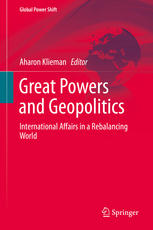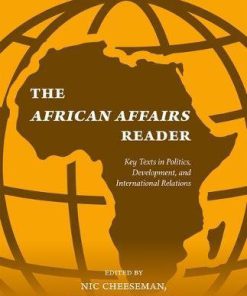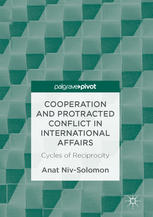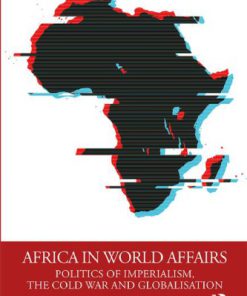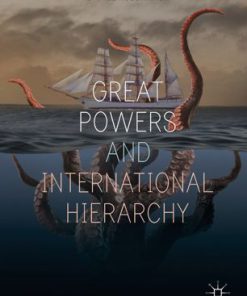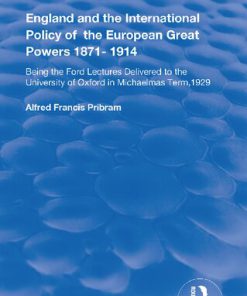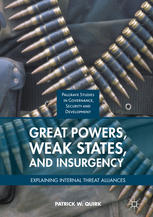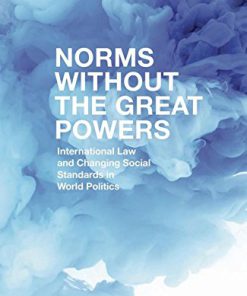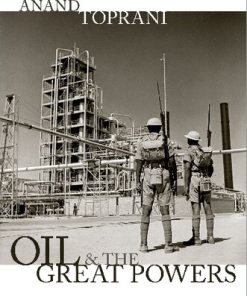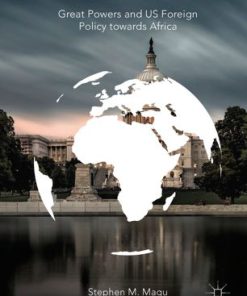Great Powers and Geopolitics International Affairs in a Rebalancing World 1st Edition by Aharon Klieman ISBN 3319162896 9783319162898
$50.00 Original price was: $50.00.$25.00Current price is: $25.00.
Great Powers and Geopolitics International Affairs in a Rebalancing World 1st Edition by Aharon Klieman – Ebook PDF Instant Download/Delivery: 3319162896, 9783319162898
Full download Great Powers and Geopolitics International Affairs in a Rebalancing World 1st Edition after payment
Product details:
ISBN 10: 3319162896
ISBN 13: 9783319162898
Author: Aharon Klieman
This book presents the theoretical-historical-comparative political framework needed to fully grasp the truly dynamic nature of 21st century global affairs. The author provides a realistic assessment of the shift from U.S predominance to a new mix of counterbalancing rival middle-tier and assertive regional powers, while highlighting those geopolitical zones of contention most critical for future international stability. The book will appeal to scholars and policy makers interested in understanding the contours of the emerging world order, and in identifying its principal shapers and leading political actors.
Great Powers and Geopolitics International Affairs in a Rebalancing World 1st Table of contents:
1 “Great Powers´´, “Geopolitics´´, the “Balance´´ and “Balancing´´ of Power
2 Studies in Great Power Balancing Politics
Pushing Back: The Balance and Balancing of Power
1 Balance of Power Revisited
2 Balancing of Power Theory
3 A Multipolar Moment
4 The U.S.: Yielding Pride of Position
5 A Doctrine for a Changing World
References
The Rise of the Others: Can the U.S. Stay on Top?
1 Introduction
2 The Argument
3 Literature Review
3.1 The Current Polarity and Its Future
3.1.1 Economics
3.1.2 Military/Security
3.1.3 American Decline and a New Structure
3.2 Winds of Change in the Diplomatic Arena?
3.3 The Competing Strategies
4 A Geopolitical View: America´s Entrenched Advantage
4.1 The Sea-Power/Land-Power Struggle
4.2 The Geographical Setting
4.2.1 The United States
4.2.2 China
4.2.3 Accommodating Vital Interests to the New Reality
5 Conclusions: Is the “Unipolar Moment´´ Over?
References
Interdependence, Balancing and Conflict in Russian-Turkish Relations
1 Introduction
2 Russian-Turkish Rapprochement: 2003-2011
3 Explaining the Rapprochement Between Russia and Turkey, 2003-2011
3.1 Economic Interdependence and Political Cooperation
3.2 Convergence of Security Interests and Balancing Against Threat
4 Russian-Turkish Relations Since 2011: From Cooperation to Competition?
4.1 The Shift in Security Parameters in the Caucasus and the Middle East
4.2 Energy as a Source of Conflict
5 Conclusion
References
Congruous or Conflicting? Great Power Configurations in the Balkans
1 Introduction
2 Theoretical Framework (Great Power Peace)
3 Foreign Relations
3.1 EU-Russia
3.2 Turkey-EU
3.3 Russia-Turkey
4 The European Union´s Sphere of Control
5 Turkey´s Projection of Soft Power
6 Post-Soviet Russian Policy toward the Balkans
7 Conclusions
References
Competing Hegemons: EU and Russian Power Projection in the South Caucasus
1 Introduction
2 Theoretical Framework
3 Russia´s “Special´´ Sphere
4 Competition in the “Common Neighbourhood´´
5 European Geopolitics and Geopolitical Actors
6 EU Power Projection in Russia´s Backyard
7 Russia´s Geopolitical Power Potential
8 Conclusion
References
Russian Perspectives on US-China Relations and the Twenty-First-Century Global System
1 Theoretical Framework and Overview of Russian Discourses
1.1 Liberals
1.2 Great Power Balancers
1.3 Nationalists
2 Russian Beliefs About Self, Global Trends, the US, and China
3 Policy Implications: The China Factor in the American-Russian Relations
References
Is Russia a Great Power in Asia?
1 Introduction
2 The Concept of Russia as a Great Power
3 The Asian “Vector´´
4 Russia´s Problematic Great Power Status
References
Eurasian Great Power Triangle
1 Setting the Scene: The Asia-Pacific Theater as Part of the Eurasian Geopolitical Continuum
2 The Asia-Pacific Theater
3 The US-China Rivalry
4 Second-Tier Powers in the Asia-Pacific
4.1 Japan: A Potential Third Pole
4.2 India: Still a South Asian Power
4.3 Russia: Pursuing Limited Objectives
5 Would-Be Great Powers in the Asia-Pacific
5.1 Korea: A Great Power After Unification?
5.2 Indonesia: A Great Power by 2050?
6 Can Europe Be a Strategic Actor in the Asia-Pacific?
7 The Asia-Pacific´s Geography: Force for Peace or War?
8 US-Russia-China Triangle: Pulling Eurasian Geopolitics Together
9 Conclusion
References
Pulling Their Punches: BRIC Foreign Policies in the Middle East
1 Global Power and BRIC Perspectives on the Middle East
2 Parameters of BRIC Engagement with the Middle East
2.1 China
2.2 India
2.3 Russia
2.4 Brazil
3 Contemporary BRIC Approaches to the Middle East
3.1 Iraq
3.2 Israeli-Palestinian Conflict
3.3 Iran´s Nuclear Program
3.4 Arab Uprising
4 Accounting for and Transforming BRIC Reticence?
References
Strategic Hedging by Non-Great Powers in the Persian Gulf
1 Introduction
2 The Concept of Strategic Hedging
3 The GCC and Iran
4 External and Internal Calculations
5 Pros and Cons of Hedging
6 Refining the Concept
References
Conclusions: Towards a New Equilibrium
1 Order, Disorder and Balancing
2 Multiple Balancing Acts
3 Greater and Lesser Powers
4 Other Candidates
5 Regional Contests and Configurations
6 Great Powers, Balancing and Geopolitics
People also search for Great Powers and Geopolitics International Affairs in a Rebalancing World 1st:
Tags:
Aharon Klieman,Great Powers,Geopolitics International,Affairs,Rebalancing World
You may also like…
Politics & Philosophy - Government & Politics
Politics & Philosophy
Politics & Philosophy
Africa In World Affairs Politics Of Imperialism The Cold War And Globalisation Rajen Harshé
History - European History
Politics & Philosophy
Politics & Philosophy - Social Sciences
Politics & Philosophy - Anthropology
Oil and the Great Powers: Britain and Germany, 1914 to 1945 First Edition Anand Toprani
Politics & Philosophy - Government & Politics
Great Powers and US Foreign Policy towards Africa Stephen M. Magu


